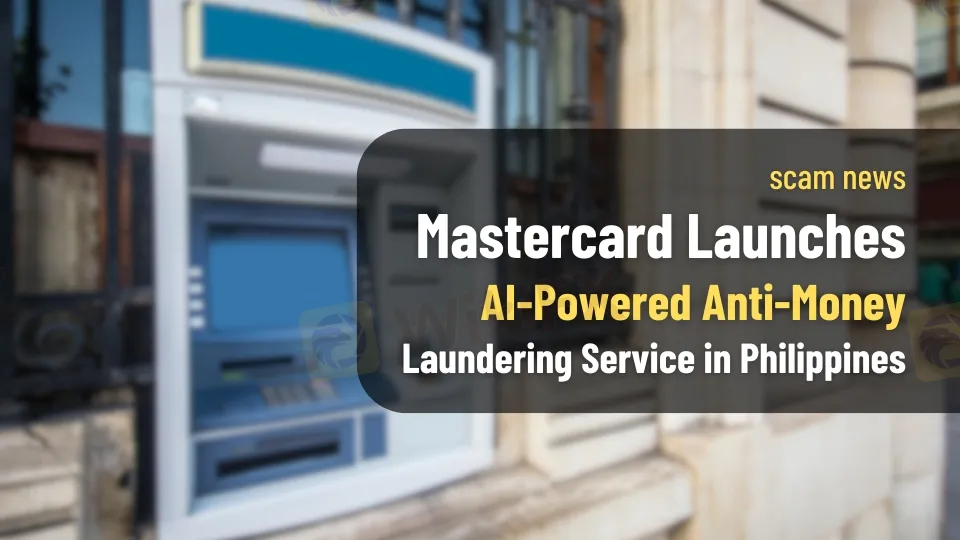简体中文
繁體中文
English
Pусский
日本語
ภาษาไทย
Tiếng Việt
Bahasa Indonesia
Español
हिन्दी
Filippiiniläinen
Français
Deutsch
Português
Türkçe
한국어
العربية
Mastercard Launches AI-Powered Anti-Money Laundering Service in Philippines
Abstract:Mastercard introduces AI-driven TRACE in the Philippines to combat financial crime, enhancing fraud prevention and securing real-time payments.

Mastercard has launched its cutting-edge anti-money laundering solution in the Philippines, which uses artificial intelligence (AI) to tackle financial crime. This program, part of its TRACE (Trace Financial Crime) service, is the first to use the technology in the Asia-Pacific area. The service is being launched in partnership with BancNet, Inc., the Philippines' premier interbank network, and will be used by 36 local banks to improve fraud prevention efforts.
The Philippines' fast-expanding digital payments industry has made it an attractive target for fraudsters. According to Mastercard Philippines Country Manager Simon A. Calasanz, “The Philippines has seen rapid digital payments growth, making it more important than ever to strengthen defenses against financial crime.” With cybercrime harming both consumers and financial institutions, there has never been a greater need for stronger, more coordinated fraud prevention solutions.
 Table of Contents
Table of ContentsGrowing Cybercrime in the Philippines
Alarming numbers demonstrate the necessity for better fraud protection measures. In 2024, the Philippines' Cybercrime Investigation and Coordinating Center (CICC) recorded 10,004 online fraud complaints, totaling roughly ₱198 million in damages. Real-time payment platforms, such as InstaPay, have become a haven for money launderers and crooks looking to take advantage of financial accounts in romance and investment schemes.

Mastercard's TRACE solution solves these problems by examining payment data from numerous financial institutions. It detects fraudulent transactions, flags suspect accounts and notifies banks in real time. BancNet CEO Elmarie S. Reyes stressed the significance of this relationship, stating, “As frauds get increasingly complex, robust tech-powered prevention and monitoring capabilities are crucial. Our collaboration with Mastercard and use of TRACE provides us and network participants with the knowledge to spot fraud more quickly, making scam protection sharper and more successful.”
TRACE's Operations
TRACE is intended to track down illegal cash scattered over real-time payment networks, detect money mule operations, and flag suspicious money laundering accounts. This feature is especially important as the Philippines implements its new Anti-Financial Account Scamming Act, which aims to prevent financial fraud and safeguard consumers.
After the United Kingdom, the Philippines is only the second market in the world to deploy TRACE. Matthew Driver, Executive Vice-President of Mastercard Asia Pacific Services, emphasized the importance of this rollout: “The launch of TRACE in the Asia Pacific marks a transformative step toward safeguarding the integrity of Real-Time Payments while combating the corrosive effects of financial crime. TRACE serves to safeguard consumers and financial institutions by ensuring that transactions are secure and compliant, while also creating confidence in the digital economy—which is vital for the region's economic success.”
Step Towards a Secure Digital Economy
Mastercard's partnership with BancNet demonstrates the company's commitment to building a strong global financial system. The test implementation in the Philippines paves the way for greater acceptance in Asia-Pacific, where digital payment systems are quickly growing.
As financial crimes get more complex, integrating AI-powered solutions such as TRACE is critical for staying ahead of hackers. Mastercard and BancNet are not only safeguarding customers by improving fraud detection and prevention capabilities but also promoting confidence in the digital economy, which is vital for the region's long-term economic success.
With the successful deployment of TRACE in the Philippines, Mastercard is now ready to cooperate with other stakeholders across Asia-Pacific to ensure a safer and more secure financial environment for everybody.

Disclaimer:
The views in this article only represent the author's personal views, and do not constitute investment advice on this platform. This platform does not guarantee the accuracy, completeness and timeliness of the information in the article, and will not be liable for any loss caused by the use of or reliance on the information in the article.
Read more

ZachXBT Exposes Crypto Beast’s $11M $ALT Token Dump Scheme
ZachXBT uncovers Crypto Beast’s $11 million pump and dump scheme, causing $ALT token’s crash and wiping out retail investors. Read the full investigation.

MFSA Warns of Digital Market Mining Scam: Alchemy Markets Clone
The MFSA warns that Digital Market Mining is a fraudulent clone of Alchemy Markets Ltd. Learn how to identify financial scams and protect your investments.

Major U.S. Banks Plan Stablecoin Launch Amid Crypto Regulations
Major U.S. banks like Bank of America and Citibank explore stablecoins as new crypto-friendly bills set to reshape digital assets' role in finance.

XM Launches Unlimited Cashback Promotion for Traders Worldwide
XM launches unlimited trading cashback from July 15 to August 15. Get unlimited rebates with a Standard or Micro account and enjoy expanded trader club benefits.
WikiFX Broker
Latest News
Asia-Pacific stocks fall as investors weigh recent trade developments
Is Your Forex Strategy Failing? Here’s When to Change
FSMA Warns That Some Firms Operate as Pyramid Schemes
Apex Trader Funding is an Unregulated Firm | You Must Know the Risks
LVMH shares jump 2.5% after reporting better-than-feared earnings, Texas factory plans
What WikiFX Found When It Looked Into Vestrado
Is the Forex Bonus a Genuine Perk or Just a Gimmick?
eToro Joins Hands with Premiership Women’s Rugby
OctaFX Was Fined $37,000 for Operating Without a License
Hantec Financial: A Closer Look at Its Licenses
Currency Calculator



